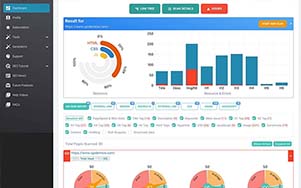Improve SEO Performance with Technical SEO Tools
Help discover issues that may be hindering your search engine rankings

Using an SEO tool for Technical SEO and Website Audits
Search Engine Optimization (SEO) is an ever-evolving field that requires webmasters and digital marketers to stay updated with the latest trends and tools. One such tool that has become indispensable for SEO professionals is the SEO Spider Website Crawler. In this essay, we will delve into the world of SEO Spider Website Crawlers, exploring their functionality, benefits, and how they play a crucial role in optimizing websites for search engines.At its core, an SEO Spider Website Crawler is a software application designed to mimic the behavior of search engine spiders or bots. These crawlers traverse websites, analyzing various aspects of their structure and content, much like search engines do when indexing web pages. The primary goal of an SEO Spider is to gather data about a website's pages, links, and overall architecture. This data is then used to identify issues, optimize content, and improve a site's visibility in search engine results pages (SERPs).
One of the standout features of SEO Spider Crawlers is their ability to provide a comprehensive audit of a website's on-page and technical SEO elements. This audit covers a wide range of factors, including meta tags, header tags, URL structures, internal and external links, and much more. By scrutinizing these elements, SEO professionals can uncover issues that might be hindering a site's search engine rankings.
One of the most valuable functions of an SEO Spider Crawler is the ability to identify broken links. Broken links can harm the user experience and have a negative impact on a website's SEO. Crawlers scour the website, flagging any links that lead to non-existent pages or return error codes, allowing webmasters to fix these issues promptly.
Website structure plays a vital role in SEO, and SEO Spider Crawlers can help assess it effectively. These tools provide insights into the hierarchy of a site's pages, ensuring that the most important pages are easily accessible to both users and search engine bots. Correcting structural issues based on crawler findings can lead to improved rankings and user experience.
Duplicate content is a major concern in SEO, as it can confuse search engines and dilute a website's authority. SEO Spider Crawlers are proficient in identifying duplicate content across a website, whether it's within the same domain or across multiple domains. This allows webmasters to take corrective measures, such as canonical tags or 301 redirects, to consolidate duplicate content and prevent SEO-related issues.
When it comes to optimizing a website for search engines, page load speed is a critical factor. Slow-loading pages can lead to higher bounce rates and decreased rankings. SEO Spider Crawlers can evaluate the loading speed of individual pages and provide recommendations for improving it. This might include compressing images, reducing server response times, or leveraging browser caching.
In addition to analyzing on-page elements, SEO Spider Crawlers delve into the realm of technical SEO. They can assess a website's robots.txt file, which instructs search engines on which pages to crawl and index. Any misconfigurations in the robots.txt file can have detrimental effects on a site's visibility. SEO professionals rely on crawlers to identify and rectify such issues.
Another technical aspect that SEO Spider Crawlers examine is XML sitemaps. These sitemaps provide search engines with a roadmap of a website's structure, helping them index pages more efficiently. Crawlers can verify the accuracy of XML sitemaps, ensuring that they include all important pages and are regularly updated.
The mobile-friendliness of a website is a crucial factor in SEO, especially after Google's mobile-first indexing update. SEO Spider Crawlers can emulate mobile user agents, allowing them to analyze a website's mobile version for issues such as responsive design, mobile usability, and mobile page load speed. This information is invaluable for optimizing a site's mobile experience.
One of the challenges of SEO is staying on top of changes and ensuring that websites remain compliant with search engine guidelines. SEO Spider Crawlers are equipped to check for any technical or on-page SEO issues that might arise due to algorithm updates or changes in best practices. This proactive approach helps webmasters adapt quickly and maintain their rankings.
As websites grow and evolve, it's common for pages to be added, modified, or removed. These changes can impact a site's SEO, especially if proper redirects are not in place. SEO Spider Crawlers can detect page-level changes and flag any instances where 301 redirects or canonical tags are missing. This ensures that both users and search engines are directed to the most relevant pages.
Beyond the technical aspects, SEO Spider Crawlers also assist in competitive analysis. They can compare a website's on-page SEO elements, keyword usage, and backlink profiles against those of competitors. This information can help SEO professionals identify areas where they can outperform competitors and gain a competitive edge.
In the realm of international SEO, SEO Spider Crawlers prove to be invaluable. They can analyze hreflang tags, which are used to indicate language and regional targeting. Correct implementation of hreflang tags ensures that search engines display the appropriate language or regional version of a page to users, improving international SEO efforts.
In summary, SEO Spider Website Crawlers are indispensable tools for SEO professionals and webmasters alike. These versatile applications provide a comprehensive analysis of websites, uncovering on-page and technical SEO issues that need attention. By leveraging the insights provided by SEO Spider Crawlers, webmasters can take proactive steps to optimize their websites, improve their search engine rankings, and ultimately enhance the user experience. In the ever-changing landscape of SEO, these crawlers remain a constant and reliable companion for those seeking to navigate the complexities of search engine optimization.
The above information is a brief explanation of this technique. To learn more about how we can help your company improve its rankings in the SERPs, contact our team below.

Bryan Williamson
Web Developer & Digital Marketer

Web Developer & Digital Marketer
Digital Marketer and Web Developer focusing on Technical SEO and Website Audits. I spent the past 26 years of my life improving my skillset primarily in Organic SEO and enjoy coming up with new innovative ideas for the industry.













